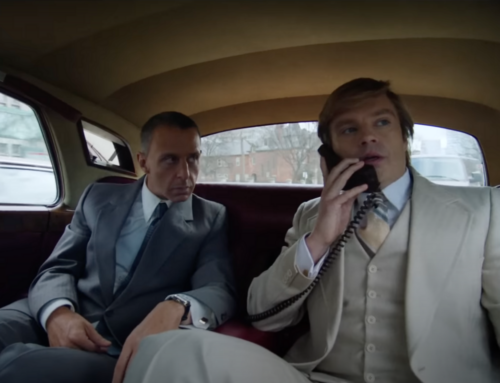Has filmmaker Christopher Nolan (“Inception,” Memento”) outsmarted himself? Oh yes he has. His latest and much anticipated TENET is another mind bender of a sci-fi thriller, but its thrills are tempered by the tedium of its method as an end in itself, instead of a means to an end we care about. The result is a humorless, superficially complex film masking a standard plot lacking emotional drive and chemistry between its stars. While enhanced by presentation on the large screen, the film would suffer little if we watched it at home.
TENET has been the most anticipated film of the year to date, its original opening pushed back because of Covid, and then again this summer because of Nolan’s insistence that it only be seen in theaters, no special screening links even for critics. Many critics therefore declined to see it, even under the strictest viewing conditions. I felt it was reasonably safe to do so and saw it at a theater ventilated and fumigated per COVID standards, along with two other critics, all three of us of us masked, none of us eating, and all quite socially distanced.
Nolan’s TENET, the title of which is a palindrome–a word that doubles back on itself and spells the same word backward and forward– is a linguistic curiosity and may be seen as a metaphor for the framing of the fourth dimension—time. In TENET, time– as we know from Einstein– is not linear and this idea becomes the governing “tenet” for the main character and the film. Nolan, true to form takes this idea of mutable reality and runs with it, as he has before, this time with characters and incidents doubling back and forth on themselves in a dizzying maze of infinite time and overlapping existences.
Nolan starts playing with us and our perceptions almost before we’re even sure the movie has begun. The opening scene takes place in the Kiev Opera House where a performance is about to begin, when suddenly masked intruders burst into the audience. Soon it’s clear that there is a double agent among them, who is then rescued by a CIA operative known as “The Protagonist” (John David Washington) along with a strange mechanism.
The Protagonist eventually discovers that he’s passed the test of a secret organization called “Tenet” and his mission is really to figure out where the “inverted” bullets came from, bullets which, we are told traveled backward in time from the future! The sight of bullets in reverse, “un-penetrating” something or someone– looks pretty cool onscreen, and in a big expository scene in a laboratory it is explained for The Protagonist and us how “inversion” works so that anything can be “inverted” in time– car chases, people, etc.
So the rules set us up for some head-spinning paradoxes and The Protagonist, with the operational “tenet” in mind is lead from one mysterious encounter to another. Someone named Neil (Robert Pattinson) helps him, but it’s never very clear who he is, where he came from, or why he’s helping. There’s also a terrifying bad guy in the form of Kenneth Branaugh who is an abusive husband to wife Elizabeth Debicki. We’ve seen his sort of megalomaniac before. The Protagonist and Neil don’t seem to know exactly what they’re after as they skip the space/time continuum, but when they find out—their mission may be thought of as something akin to Harry Potter tracking down horcruxes before Lord Voldemort gets to them. Total power and/or world extinction is a possibility.
Washington is relentless, fleet on his feet, and wears a suit well. Pattinson seems superfluous as his partner, wears a suit even better, and we have a hint of the last act reveal about his identity. There are no dazzling locations, and a few cool special effects. But seeing a car chase for the second time in reverse isn’t more exciting, neither is the second time seeing a bullet in reverse. But once people are inverted and they start running into themselves– I lost track.
The film depends on our being hooked on the conceptual acrobatics Nolan puts us through in order to keep up with the temporal logistics, and it grew wearying over time, especially while a too-loud sound mix kept interfering with my ability to hear let alone decipher what people were saying. The Protagonist and Neil also have no particular chemistry. What’s between them is aridly humorless. I caught one quip muttered by The Protagonist during an overly invasive pat down when he remarks that the person doing the patting “usually buys him dinner first.” I guess old jokes flow backward in time too.
Nolan’s brilliant “Memento” is a “who done it,” about a man with short-term memory loss who is driven to finding out who killed his wife by piecing together his splintered reality. “Inception” is a heist involving a thief who has a shot at personal redemption by successfully pulling off one more job; this involves infiltrating the subconscious and reversing how dreams work as he and we are drawn into a labyrinth of dreams vs reality.
But TENET, while a spy thriller, leaves out the reason for the thrills. This duo seems to have nothing personal at stake, nothing emotional driving the action. The abstract challenge of solving a mental puzzle is here an end in itself rather than a means to some sort of pay off that would stir us. I didn’t care about these two beyond how I’d feel about the action inside a pinball machine. Nolan seems to have left his heart out, and we are left with a cerebrally challenging but hollow film, a dizzying conundrum which grew gradually more exhausting until I mentally checked out. TENET is a cool, temporal mind game masquerading as an action thriller but with no heat to drive it.
Which brings me to Bill S. Preston Esquire and Ted Theadore Logan, ever the Wild Stallions, whose excellent adventures involve a simple phone booth from 1989 as they travel through time and continue their quest to write that pivotal song in BILL & TED FACE THE MUSIC.
Keanu Reeves and Alex Winter are longer in the tooth, but they haven’t lost their appetite for adventure and their very basic chemistry. Now they have wives (Erinn Hayes and Jayma Mays) and daughters (Samara Weaving and Brigitte Lundy Paine) who are chips off the old blockheads and accompany them to hell and back in their modest quest: to fulfill their destiny by writing a song that will save the world and “reality as we know it across all time.” Once again, they round up history’s greats to help out. Mozart and Hendrix are involved (and others whose appearances I won’t give away!) and Death (William Sadler) in his most hilarious role since spoofing Ingmar Bergman’s films in “De Duve.” Death is no match for Bill and Ted who charm the scythe right out of his hands and escape to their phone booth time machine with seconds to spare. (Chris Nolan pay attention- this was more fun than Tenet).
I laughed myself silly as Bill and Ted entered couples therapy, together, much to the dismay of their wives, patiently hoping that their joined-at-the-hip husbands would sort out separate identities. There are many to choose from here, a motley buffet of alternative future Bills and Teds in this delightfully nonsensical time-traveling escapade. Alex Winter seemed a bit out of his depth, but no one plays dumb better than Keanu who has perfected the blank stare, the dorky tossing of a hank of hair, and a vocal inflection which locates that sublime spot somewhere between brilliance and boneheadedness. BILL & TED FACE THE MUSIC are unpretentious silly fun. Their adventures still rule. Now available at home!






Leave A Comment
You must be logged in to post a comment.